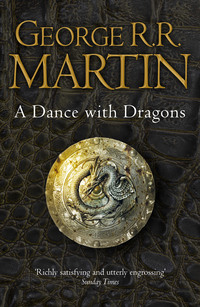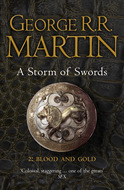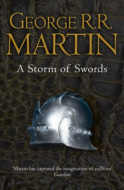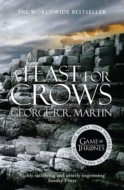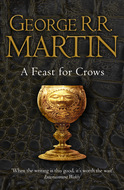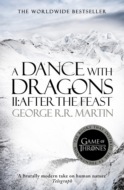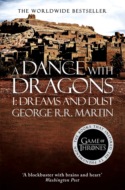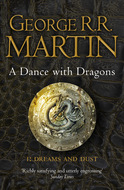Kitap dosya olarak indirilemez ancak uygulamamız üzerinden veya online olarak web sitemizden okunabilir.
Kitabı oku: «A Dance With Dragons Complete Edition (Two in One)», sayfa 2
You warned me, Varamyr thought, but it was you who showed me Eastwatch too. He could not have been more than ten. Haggon traded a dozen strings of amber and a sled piled high with pelts for six skins of wine, a block of salt, and a copper kettle. Eastwatch was a better place to trade than Castle Black; that was where the ships came, laden with goods from the fabled lands beyond the sea. The crows knew Haggon as a hunter and a friend to the Night’s Watch, and welcomed the news he brought of life beyond their Wall. Some knew him for a skinchanger too, but no one spoke of that. It was there at Eastwatch-by-the-Sea that the boy he’d been first began to dream of the warm south.
Varamyr could feel the snowflakes melting on his brow. This is not so bad as burning. Let me sleep and never wake, let me begin my second life. His wolves were close now. He could feel them. He would leave this feeble flesh behind, become one with them, hunting the night and howling at the moon. The warg would become a true wolf. Which, though?
Not Sly. Haggon would have called it abomination, but Varamyr had often slipped inside her skin as she was being mounted by One Eye. He did not want to spend his new life as a bitch, though, not unless he had no other choice. Stalker might suit him better, the younger male … though One Eye was larger and fiercer, and it was One Eye who took Sly whenever she went into heat.
“They say you forget,” Haggon had told him, a few weeks before his own death. “When the man’s flesh dies, his spirit lives on inside the beast, but every day his memory fades, and the beast becomes a little less a warg, a little more a wolf, until nothing of the man is left and only the beast remains.”
Varamyr knew the truth of that. When he claimed the eagle that had been Orell’s, he could feel the other skinchanger raging at his presence. Orell had been slain by the turncloak crow Jon Snow, and his hate for his killer had been so strong that Varamyr found himself hating the beastling boy as well. He had known what Snow was the moment he saw that great white direwolf stalking silent at his side. One skinchanger can always sense another. Mance should have let me take the direwolf. There would be a second life worthy of a king. He could have done it, he did not doubt. The gift was strong in Snow, but the youth was untaught, still fighting his nature when he should have gloried in it.
Varamyr could see the weirwood’s red eyes staring down at him from the white trunk. The gods are weighing me. A shiver went through him. He had done bad things, terrible things. He had stolen, killed, raped. He had gorged on human flesh and lapped the blood of dying men as it gushed red and hot from their torn throats. He had stalked foes through the woods, fallen on them as they slept, clawed their entrails from their bellies and scattered them across the muddy earth. How sweet their meat had tasted. “That was the beast, not me,” he said in a hoarse whisper. “That was the gift you gave me.”
The gods made no reply. His breath hung pale and misty in the air. He could feel ice forming in his beard. Varamyr Sixskins closed his eyes.
He dreamt an old dream of a hovel by the sea, three dogs whimpering, a woman’s tears.
Bump. She weeps for Bump, but she never wept for me.
Lump had been born a month before his proper time, and he was sick so often that no one expected him to live. His mother waited until he was almost four to give him a proper name, and by then it was too late. The whole village had taken to calling him Lump, the name his sister Meha had given him when he was still in their mother’s belly. Meha had given Bump his name as well, but Lump’s little brother had been born in his proper time, big and red and robust, sucking greedily at Mother’s teats. She was going to name him after Father. Bump died, though. He died when he was two and I was six, three days before his nameday.
“Your little one is with the gods now,” the woods witch told his mother, as she wept. “He’ll never hurt again, never hunger, never cry. The gods have taken him down into the earth, into the trees. The gods are all around us, in the rocks and streams, in the birds and beasts. Your Bump has gone to join them. He’ll be the world and all that’s in it.”
The old woman’s words had gone through Lump like a knife. Bump sees. He is watching me. He knows. Lump could not hide from him, could not slip behind his mother’s skirts or run off with the dogs to escape his father’s fury. The dogs. Loptail, Sniff, the Growler. They were good dogs. They were my friends.
When his father found the dogs sniffing round Bump’s body, he had no way of knowing which had done it, so he took his axe to all three. His hands shook so badly that it took two blows to silence Sniff and four to put the Growler down. The smell of blood hung heavy in the air, and the sounds the dying dogs had made were terrible to hear, yet Loptail still came when father called him. He was the oldest dog, and his training overcame his terror. By the time Lump slipped inside his skin it was too late.
No, Father, please, he tried to say, but dogs cannot speak the tongues of men, so all that emerged was a piteous whine. The axe crashed into the middle of the old dog’s skull, and inside the hovel the boy let out a scream. That was how they knew. Two days later, his father dragged him into the woods. He brought his axe, so Lump thought he meant to put him down the same way he had done the dogs. Instead he’d given him to Haggon.
Varamyr woke suddenly, violently, his whole body shaking. “Get up,” a voice was screaming, “get up, we have to go. There are hundreds of them.” The snow had covered him with a stiff white blanket. So cold. When he tried to move, he found that his hand was frozen to the ground. He left some skin behind when he tore it loose. “Get up,” she screamed again, “they’re coming.”
Thistle had returned to him. She had him by the shoulders and was shaking him, shouting in his face. Varamyr could smell her breath and feel the warmth of it upon cheeks gone numb with cold. Now, he thought, do it now, or die.
He summoned all the strength still in him, leapt out of his own skin, and forced himself inside her.
Thistle arched her back and screamed.
Abomination. Was that her, or him, or Haggon? He never knew. His old flesh fell back into the snowdrift as her fingers loosened. The spearwife twisted violently, shrieking. His shadowcat used to fight him wildly, and the snow bear had gone half-mad for a time, snapping at trees and rocks and empty air, but this was worse. “Get out, get out!” he heard her own mouth shouting. Her body staggered, fell, and rose again, her hands flailed, her legs jerked this way and that in some grotesque dance as his spirit and her own fought for the flesh. She sucked down a mouthful of the frigid air, and Varamyr had half a heartbeat to glory in the taste of it and the strength of this young body before her teeth snapped together and filled his mouth with blood. She raised her hands to his face. He tried to push them down again, but the hands would not obey, and she was clawing at his eyes. Abomination, he remembered, drowning in blood and pain and madness. When he tried to scream, she spat their tongue out.
The white world turned and fell away. For a moment it was as if he were inside the weirwood, gazing out through carved red eyes as a dying man twitched feebly on the ground and a madwoman danced blind and bloody underneath the moon, weeping red tears and ripping at her clothes. Then both were gone and he was rising, melting, his spirit borne on some cold wind. He was in the snow and in the clouds, he was a sparrow, a squirrel, an oak. A horned owl flew silently between his trees, hunting a hare; Varamyr was inside the owl, inside the hare, inside the trees. Deep below the frozen ground, earthworms burrowed blindly in the dark, and he was them as well. I am the wood, and everything that’s in it, he thought, exulting. A hundred ravens took to the air, cawing as they felt him pass. A great elk trumpeted, unsettling the children clinging to his back. A sleeping direwolf raised his head to snarl at empty air. Before their hearts could beat again he had passed on, searching for his own, for One Eye, Sly, and Stalker, for his pack. His wolves would save him, he told himself.
That was his last thought as a man.
True death came suddenly; he felt a shock of cold, as if he had been plunged into the icy waters of a frozen lake. Then he found himself rushing over moonlit snows with his packmates close behind him. Half the world was dark. One Eye, he knew. He bayed, and Sly and Stalker gave echo.
When they reached the crest the wolves paused. Thistle, he remembered, and a part of him grieved for what he had lost and another part for what he’d done. Below, the world had turned to ice. Fingers of frost crept slowly up the weirwood, reaching out for each other. The empty village was no longer empty. Blue-eyed shadows walked amongst the mounds of snow. Some wore brown and some wore black and some were naked, their flesh gone white as snow. A wind was sighing through the hills, heavy with their scents: dead flesh, dry blood, skins that stank of mold and rot and urine. Sly gave a growl and bared her teeth, her ruff bristling. Not men. Not prey. Not these.
The things below moved, but did not live. One by one, they raised their heads toward the three wolves on the hill. The last to look was the thing that had been Thistle. She wore wool and fur and leather, and over that she wore a coat of hoarfrost that crackled when she moved and glistened in the moonlight. Pale pink icicles hung from her fingertips, ten long knives of frozen blood. And in the pits where her eyes had been, a pale blue light was flickering, lending her coarse features an eerie beauty they had never known in life.
She sees me.
TYRION
He drank his way across the narrow sea.
The ship was small, his cabin smaller, but the captain would not allow him abovedecks. The rocking of the deck beneath his feet made his stomach heave, and the wretched food tasted even worse when retched back up. But why did he need salt beef, hard cheese, and bread crawling with worms when he had wine to nourish him? It was red and sour, very strong. Sometimes he heaved the wine up too, but there was always more.
“The world is full of wine,” he muttered in the dankness of his cabin. His father never had any use for drunkards, but what did that matter? His father was dead. He’d killed him. A bolt in the belly, my lord, and all for you. If only I was better with a crossbow, I would have put it through that cock you made me with, you bloody bastard.
Belowdecks, there was neither night nor day. Tyrion marked time by the comings and goings of the cabin boy who brought the meals he did not eat. The boy always brought a brush and bucket too, to clean up. “Is this Dornish wine?” Tyrion asked him once, as he pulled a stopper from a skin. “It reminds me of a certain snake I knew. A droll fellow, till a mountain fell on him.”
The cabin boy did not answer. He was an ugly boy, though admittedly more comely than a certain dwarf with half a nose and a scar from eye to chin. “Have I offended you?” Tyrion asked, as the boy was scrubbing. “Were you commanded not to talk to me? Or did some dwarf diddle your mother?” That went unanswered too. “Where are we sailing? Tell me that.” Jaime had made mention of the Free Cities, but had never said which one. “Is it Braavos? Tyrosh? Myr?” Tyrion would sooner have gone to Dorne. Myrcella is older than Tommen, by Dornish law the Iron Throne is hers. I will help her claim her rights, as Prince Oberyn suggested.
Oberyn was dead, though, his head smashed to bloody ruin by the armored fist of Ser Gregor Clegane. And without the Red Viper to urge him on, would Doran Martell even consider such a chancy scheme? He might clap me in chains instead and hand me back to my sweet sister. The Wall might be safer. Old Bear Mormont said the Night’s Watch had need of men like Tyrion. Mormont might be dead, though. By now Slynt may be the lord commander. That butcher’s son was not like to have forgotten who sent him to the Wall. Do I really want to spend the rest of my life eating salt beef and porridge with murderers and thieves? Not that the rest of his life would last very long. Janos Slynt would see to that.
The cabin boy wet his brush and scrubbed on manfully. “Have you ever visited the pleasure houses of Lys?” the dwarf inquired. “Might that be where whores go?” Tyrion could not seem to recall the Valyrian word for whore, and in any case it was too late. The boy tossed his brush back in his bucket and took his leave.
The wine has blurred my wits. He had learned to read High Valyrian at his maester’s knee, though what they spoke in the Nine Free Cities … well, it was not so much a dialect as nine dialects on the way to becoming separate tongues. Tyrion had some Braavosi and a smattering of Myrish. In Tyrosh he should be able to curse the gods, call a man a cheat, and order up an ale, thanks to a sellsword he had once known at the Rock. At least in Dorne they speak the Common Tongue. Like Dornish food and Dornish law, Dornish speech was spiced with the flavors of the Rhoyne, but a man could comprehend it. Dorne, yes, Dorne for me. He crawled into his bunk, clutching that thought like a child with a doll.
Sleep had never come easily to Tyrion Lannister. Aboard that ship it seldom came at all, though from time to time he managed to drink sufficient wine to pass out for a while. At least he did not dream. He had dreamed enough for one small life. And of such follies: love, justice, friendship, glory. As well the dream of being tall. It was all beyond his reach, Tyrion knew now. But he did not know where whores go.
“Wherever whores go,” his father had said. His last words, and what words they were. The crossbow thrummed, Lord Tywin sat back down, and Tyrion Lannister found himself waddling through the darkness with Varys at his side. He must have clambered back down the shaft, two hundred and thirty rungs to where orange embers glowed in the mouth of an iron dragon. He remembered none of it. Only the sound the crossbow made, and the stink of his father’s bowels opening. Even in his dying, he found a way to shit on me.
Varys had escorted him through the tunnels, but they never spoke until they emerged beside the Blackwater, where Tyrion had won a famous victory and lost a nose. That was when the dwarf turned to the eunuch and said, “I’ve killed my father,” in the same tone a man might use to say, “I’ve stubbed my toe.”
The master of whisperers had been dressed as a begging brother, in a moth-eaten robe of brown roughspun with a cowl that shadowed his smooth fat cheeks and bald round head. “You should not have climbed that ladder,” he said reproachfully.
“Wherever whores go.” Tyrion had warned his father not to say that word. If I had not loosed, he would have seen my threats were empty. He would have taken the crossbow from my hands, as once he took Tysha from my arms. He was rising when I killed him.
“I killed Shae too,” he confessed to Varys.
“You knew what she was.”
“I did. But I never knew what he was.”
Varys tittered. “And now you do.”
I should have killed the eunuch as well. A little more blood on his hands, what would it matter? He could not say what had stayed his dagger. Not gratitude. Varys had saved him from a headsman’s sword, but only because Jaime had compelled him. Jaime … no, better not to think of Jaime.
He found a fresh skin of wine instead and sucked at it as if it were a woman’s breast. The sour red ran down his chin and soaked through his soiled tunic, the same one he had been wearing in his cell. The deck was swaying beneath his feet, and when he tried to rise it lifted sideways and smashed him hard against a bulkhead. A storm, he realized, or else I am even drunker than I knew. He retched the wine up and lay in it a while, wondering if the ship would sink. Is this your vengeance, Father? Has the Father Above made you his Hand? “Such are the wages of the kinslayer,” he said as the wind howled outside. It did not seem fair to drown the cabin boy and the captain and all the rest for something he had done, but when had the gods ever been fair? And around about then, the darkness gulped him down.
When he stirred again, his head felt like to burst and the ship was spinning round in dizzy circles, though the captain was insisting that they’d come to port. Tyrion told him to be quiet and kicked feebly as a huge bald sailor tucked him under one arm and carried him squirming to the hold, where an empty wine cask awaited him. It was a squat little cask, and a tight fit even for a dwarf. Tyrion pissed himself in his struggles, for all the good it did. He was crammed face-first into the cask with his knees pushed up against his ears. The stub of his nose itched horribly, but his arms were pinned so tightly that he could not reach to scratch it. A palanquin fit for a man of my stature, he thought as they hammered shut the lid. He could hear voices shouting as he was hoisted up. Every bounce cracked his head against the bottom of the cask. The world went round and round as the cask rolled downward, then stopped with a crash that made him want to scream. Another cask slammed into his, and Tyrion bit his tongue.
That was the longest journey he had ever taken, though it could not have lasted more than half an hour. He was lifted and lowered, rolled and stacked, upended and righted and rolled again. Through the wooden staves he heard men shouting, and once a horse whickered nearby. His stunted legs began to cramp, and soon hurt so badly that he forgot the hammering in his head.
It ended as it had begun, with another roll that left him dizzy and more jouncing. Outside, strange voices were speaking in a tongue he did not know. Someone started pounding on the top of the cask and the lid cracked open suddenly. Light came flooding in, and cool air as well. Tyrion gasped greedily and tried to stand, but only managed to knock the cask over sideways and spill himself out onto a hard-packed earthen floor.
Above him loomed a grotesque fat man with a forked yellow beard, holding a wooden mallet and an iron chisel. His bedrobe was large enough to serve as a tourney pavilion, but its loosely knotted belt had come undone, exposing a huge white belly and a pair of heavy breasts that sagged like sacks of suet covered with coarse yellow hair. He reminded Tyrion of a dead sea cow that had once washed up in the caverns under Casterly Rock.
The fat man looked down and smiled. “A drunken dwarf,” he said, in the Common Tongue of Westeros.
“A rotting sea cow.” Tyrion’s mouth was full of blood. He spat it at the fat man’s feet. They were in a long, dim cellar with barrel-vaulted ceilings, its stone walls spotted with nitre. Casks of wine and ale surrounded them, more than enough drink to see a thirsty dwarf safely through the night. Or through a life.
“You are insolent. I like that in a dwarf.” When the fat man laughed, his flesh bounced so vigorously that Tyrion was afraid he might fall and crush him. “Are you hungry, my little friend? Weary?”
“Thirsty.” Tyrion struggled to his knees. “And filthy.”
The fat man sniffed. “A bath first, just so. Then food and a soft bed, yes? My servants shall see to it.” His host put the mallet and chisel aside. “My house is yours. Any friend of my friend across the water is a friend to Illyrio Mopatis, yes.”
And any friend of Varys the Spider is someone I will trust just as far as I can throw him.
The fat man made good on the promised bath, though. No sooner did Tyrion lower himself into the hot water and close his eyes than he was fast asleep. He woke naked on a goose-down feather bed so soft it felt as if he had been swallowed by a cloud. His tongue was growing hair and his throat was raw, but his cock was as hard as an iron bar. He rolled from the bed, found a chamber pot, and commenced to filling it, with a groan of pleasure.
The room was dim, but there were bars of yellow sunlight showing between the slats of the shutters. Tyrion shook the last drops off and waddled over patterned Myrish carpets as soft as new spring grass. Awkwardly he climbed the window seat and flung the shutters open to see where Varys and the gods had sent him.
Beneath his window six cherry trees stood sentinel around a marble pool, their slender branches bare and brown. A naked boy stood on the water, poised to duel with a bravo’s blade in hand. He was lithe and handsome, no older than sixteen, with straight blond hair that brushed his shoulders. So lifelike did he seem that it took the dwarf a long moment to realize he was made of painted marble, though his sword shimmered like true steel.
Across the pool stood a brick wall twelve feet high, with iron spikes along its top. Beyond that was the city. A sea of tiled rooftops crowded close around a bay. He saw square brick towers, a great red temple, a distant manse upon a hill. In the far distance, sunlight shimmered off deep water. Fishing boats were moving across the bay, their sails rippling in the wind, and he could see the masts of larger ships poking up along the shore. Surely one is bound for Dorne, or for Eastwatch-by-the-Sea. He had no means to pay for passage, though, nor was he made to pull an oar. I suppose I could sign on as a cabin boy and earn my way by letting the crew bugger me up and down the narrow sea.
He wondered where he was. Even the air smells different here. Strange spices scented the chilly autumn wind, and he could hear faint cries drifting over the wall from the streets beyond. It sounded something like Valyrian, but he did not recognize more than one word in five. Not Braavos, he concluded, nor Tyrosh. Those bare branches and the chill in the air argued against Lys and Myr and Volantis as well.
When he heard the door opening behind him, Tyrion turned to confront his fat host. “This is Pentos, yes?”
“Just so. Where else?”
Pentos. Well, it was not King’s Landing, that much could be said for it. “Where do whores go?” he heard himself ask.
“Whores are found in brothels here, as in Westeros. You will have no need of such, my little friend. Choose from amongst my servingwomen. None will dare refuse you.”
“Slaves?” the dwarf asked pointedly.
The fat man stroked one of the prongs of his oiled yellow beard, a gesture Tyrion found remarkably obscene. “Slavery is forbidden in Pentos, by the terms of the treaty the Braavosi imposed on us a hundred years ago. Still, they will not refuse you.” Illyrio gave a ponderous half bow. “But now my little friend must excuse me. I have the honor to be a magister of this great city, and the prince has summoned us to session.” He smiled, showing a mouth full of crooked yellow teeth. “Explore the manse and grounds as you like, but on no account stray beyond the walls. It is best that no man knows that you were here.”
“Were? Have I gone somewhere?”
“Time enough to speak of that this evening. My little friend and I shall eat and drink and make great plans, yes?”
“Yes, my fat friend,” Tyrion replied. He thinks to use me for his profit. It was all profit with the merchant princes of the Free Cities. “Spice soldiers and cheese lords,” his lord father called them, with contempt. Should a day ever dawn when Illyrio Mopatis saw more profit in a dead dwarf than a live one, Tyrion would find himself packed into another wine cask by dusk. It would be well if I was gone before that day arrives. That it would arrive he did not doubt; Cersei was not like to forget him, and even Jaime might be vexed to find a quarrel in Father’s belly.
A light wind was riffling the waters of the pool below, all around the naked swordsman. It reminded him of how Tysha would riffle his hair during the false spring of their marriage, before he helped his father’s guardsmen rape her. He had been thinking of those guardsmen during his flight, trying to recall how many there had been. You would think he might remember that, but no. A dozen? A score? A hundred? He could not say. They had all been grown men, tall and strong … though all men were tall to a dwarf of thirteen years. Tysha knew their number. Each of them had given her a silver stag, so she would only need to count the coins. A silver for each and a gold for me. His father had insisted that he pay her too. A Lannister always pays his debts.
“Wherever whores go,” he heard Lord Tywin say once more, and once more the bowstring thrummed.
The magister had invited him to explore the manse. He found clean clothes in a cedar chest inlaid with lapis and mother-of-pearl. The clothes had been made for a small boy, he realized as he struggled into them. The fabrics were rich enough, if a little musty, but the cut was too long in the legs and too short in the arms, with a collar that would have turned his face as black as Joffrey’s had he somehow contrived to get it fastened. Moths had been at them too. At least they do not stink of vomit.
Tyrion began his explorations with the kitchen, where two fat women and a potboy watched him warily as he helped himself to cheese, bread, and figs. “Good morrow to you, fair ladies,” he said with a bow. “Do you know where whores go?” When they did not respond, he repeated the question in High Valyrian, though he had to say courtesan in place of whore. The younger, fatter cook gave him a shrug that time.
He wondered what they would do if he took them by the hand and dragged them to his bedchamber. None will dare refuse you, Illyrio claimed, but somehow Tyrion did not think he meant these two. The younger woman was old enough to be his mother, and the older was likely her mother. Both were near as fat as Illyrio, with teats that were larger than his head. I could smother myself in flesh. There were worse ways to die. The way his lord father had died, for one. I should have made him shit a little gold before expiring. Lord Tywin might have been niggardly with his approval and affection, but he had always been open-handed when it came to coin. The only thing more pitiful than a dwarf without a nose is a dwarf without a nose who has no gold.
Tyrion left the fat women to their loaves and kettles and went in search of the cellar where Illyrio had decanted him the night before. It was not hard to find. There was enough wine there to keep him drunk for a hundred years; sweet reds from the Reach and sour reds from Dorne, pale Pentoshi ambers, the green nectar of Myr, three score casks of Arbor gold, even wines from the fabled east, from Qarth and Yi Ti and Asshai by the Shadow. In the end, Tyrion chose a cask of strongwine marked as the private stock of Lord Runceford Redwyne, the grandfather of the present Lord of the Arbor. The taste of it was languorous and heady on the tongue, the color a purple so dark that it looked almost black in the dim-lit cellar. Tyrion filled a cup, and a flagon for good measure, and carried them up to the gardens to drink beneath those cherry trees he’d seen.
As it happened, he left by the wrong door and never found the pool he had spied from his window, but it made no matter. The gardens behind the manse were just as pleasant, and far more extensive. He wandered through them for a time, drinking. The walls would have shamed any proper castle, and the ornamental iron spikes along the top looked strangely naked without heads to adorn them. Tyrion pictured how his sister’s head might look up there, with tar in her golden hair and flies buzzing in and out of her mouth. Yes, and Jaime must have the spike beside her, he decided. No one must ever come between my brother and my sister.
With a rope and a grapnel he might be able to get over that wall. He had strong arms and he did not weigh much. He should be able to clamber over, if he did not impale himself on a spike. I will search for a rope on the morrow, he resolved.
He saw three gates during his wanderings—the main entrance with its gatehouse, a postern by the kennels, and a garden gate hidden behind a tangle of pale ivy. The last was chained, the others guarded. The guards were plump, their faces as smooth as babies’ bottoms, and every man of them wore a spiked bronze cap. Tyrion knew eunuchs when he saw them. He knew their sort by reputation. They feared nothing and felt no pain, it was said, and were loyal to their masters unto death. I could make good use of a few hundred of mine own, he reflected. A pity I did not think of that before I became a beggar.
He walked along a pillared gallery and through a pointed arch, and found himself in a tiled courtyard where a woman was washing clothes at a well. She looked to be his own age, with dull red hair and a broad face dotted by freckles. “Would you like some wine?” he asked her. She looked at him uncertainly. “I have no cup for you, we’ll have to share.” The washerwoman went back to wringing out tunics and hanging them to dry. Tyrion settled on a stone bench with his flagon. “Tell me, how far should I trust Magister Illyrio?” The name made her look up. “That far?” Chuckling, he crossed his stunted legs and took a drink. “I am loath to play whatever part the cheesemonger has in mind for me, yet how can I refuse him? The gates are guarded. Perhaps you might smuggle me out under your skirts? I’d be so grateful; why, I’ll even wed you. I have two wives already, why not three? Ah, but where would we live?” He gave her as pleasant a smile as a man with half a nose could manage. “I have a niece in Sunspear, did I tell you? I could make rather a lot of mischief in Dorne with Myrcella. I could set my niece and nephew at war, wouldn’t that be droll?” The washerwoman pinned up one of Illyrio’s tunics, large enough to double as a sail. “I should be ashamed to think such evil thoughts, you’re quite right. Better if I sought the Wall instead. All crimes are wiped clean when a man joins the Night’s Watch, they say. Though I fear they would not let me keep you, sweetling. No women in the Watch, no sweet freckly wives to warm your bed at night, only cold winds, salted cod, and small beer. Do you think I might stand taller in black, my lady?” He filled his cup again. “What do you say? North or south? Shall I atone for old sins or make some new ones?”
